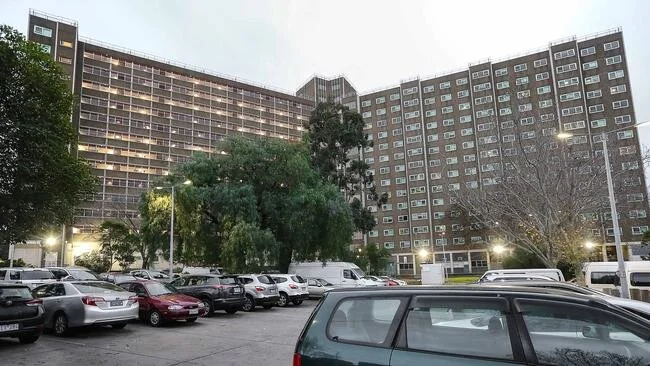Yesterday it became clear that a crisis is re-emerging in Victoria. The numbers are pointing towards widespread community transmission of COVID19 and restrictions are rapidly being tightened. In North Melbourne and Flemington, nine public housing towers have been totally locked down.
There is no question that action had to be taken. But my heart grieves for the people in those towers. Unlike others in the same suburb, those people are not allowed to leave their apartments for exercise or shopping. Five hundred police officers have been allocated to the towers to keep people in lockdown. There will be a police officer patrolling every floor.
Now, for some of us, having five hundred extra police officers around may make us feel safe. But not everyone has that experience of police. Disproportionately in an inner city, public residential tower block, there will be people who’ve experienced poor mental health, people who’ve experienced domestic violence, migrants who have come from places where police are the enemy, and First Nations people who have witnessed targeting and discrimination and lost loved ones in police related incidents.
This leads me to wonder why, in situations such as this, would we dispatch five hundred police? Why not five hundred community organisers and youth workers? A few dozen mental health specialists, and some Aboriginal community workers? What about even, God forbid, some clergy? People who could calmly and gently nurture people into safety, not just enforce rules?
Now, of course, Unions and Charities are springing into action. The State government has promised everything people need. I don’t envy those in power making such decisions, and I know that many fine people have been up all last night to ensure that these precious people are not abandoned.
But the phrase ‘defund the police’ from the global Black Lives Matter movement keeps ringing in my ears. It’s a slogan. It’s meant to be the beginning of a conversation, not the end. So when leaders in civil society say ‘defund the police’ they don’t mean abandon the investigation of armed robberies and murders and child abusers. They mean that it is too high a burden to place on police officers that they intervene in every situation of family violence, every mental health critical incident, and every instance of anti-social behaviour. We ask police to be the band aid for every perceived problem. Very often, simply increasing the number of police and the funding for police is portrayed as a silver bullet to resolve foundational tensions in communities.
Now, no serious advocate is recommending simply replacing every cop with a social worker. As the old saying goes ‘God so loved the world that she didn’t send a Social Worker’. But safe, inclusive, connected communities don’t come about by putting more cops on the beat. It is necessary to enforce just laws for the protection of vulnerable people. But society is more than the making and enforcement of rules.
As I wrestled with today’s appointed reading from the letter to the Romans, this unfolding story in yesterday’s news provided a lens through which to understand Paul’s context. When Paul talks about ‘law’, he’s not talking about the kind of law that you study these days to become a solicitor. He is talking very specifically about the body of teaching contained in Torah, the first five books of the Hebrew Scriptures. Alongside the great narratives of the faith, these texts contain the instructions for how the covenant (the relationship between God and the chosen people) is to be observed.
But before we consider what Paul is talking about, we need to address an anti-semitic trope. Amongst many Christians, it is popular to declare that Jews are ‘all about rules’. Some people talk about Jews trying to ‘earn God’s love’ by being obedient to Torah and observing the sabbath and the dietary food laws. This is always framed as a pejorative, as if to say that these Jews are so stupid and so selfish that they think they can ‘earn their way to heaven’. It is astounding how often I have heard this motif repeated, sometimes by otherwise decent and informed people. So let’s be clear, no reputable Rabbi teaches and no Jew believes that abiding by the law is somehow a pathway to earn or obtain benefit from God. The covenant is not transactional.
There are and have been, of course, instances where some Jews manipulate others into conformity by instilling fear of a vengeful God who will punish those who don’t comply. But of course that would never happen in Christianity! How preposterous!
The Judaism of Jesus and of Paul, a Judaism grounded in study of Torah, recognised that love is the fulfillment of the law. Observance of Torah – whether in relation to hygiene or agriculture – was both a response to God’s infinite love, and a means of showing love to one’s neighbour. The Jesus whom we meet in the gospels spends a lot of time encouraging people to go deeper into the covenant, to become more committed to Torah – certainly not to abandon it.
But Paul has a problem. He has a clear vocation to spread the Good News revealed in Torah and in the person of Jesus to the whole darned world. And most of the darned world are not Jews. He won’t abandon the beauty and power of Torah, but it’s also impossible to get non-Jews to authentically observe the Jewish covenant.
So what does Paul do? He universalises the covenant. He teaches about a new law, embodied in Jesus Christ, and enacted in the gathered Followers of the Way. The new law abandons the detail – men don’t need to be circumcised and people can eat prawns – but invites people into communities who submit to a single, loving God, who desires wholeness and renewal for the whole of creation.
This is at the heart of the Christian faith. We do not cower in fear before a God of wrath and vengeance, desperately trying to mollify it’s rage so we can avoid punishment. We draw close to the presence of God which is pure, self-emptying love. We transform into holy people, and grow into the likeness of Christ, not because there is external enforcement, but because there is a deep internal connection between us and God our neighbour.
Which takes us back to the tower blocks in Melbourne. I don’t want to propose some glib solution to a complex health and community crisis. But I do know that a culture of enforcement and compliance can only sustain calm for so long. God’s dream for humanity - The Beloved Community - grows in the fertile soil of humble, sacrificial service.
The Lord Be With You


